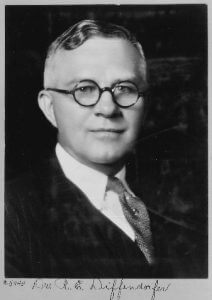
Board of Missions of the Methodist Episcopal Church , “Mission Photograph Album - Portraits #05 Page 020,” UMC Digital Galleries, accessed November 27, 2018, http://catalog.gcah.org/omeka/
items/show/60129.
Diffendorfer claimed that as a Sunday school student he was inspired with such a passion for mission by British missionary David Livingstone that it lasted his whole life. But his mother claimed that his personality had elements of P. T. Barnum as well. The passion and the leadership became apparent early, and after his education he began to work for the Board of Foreign Missions of the Methodist Episcopal Church.
He moved into leadership just when the Interchurch World Movement in 1924 was failing, leaving a host of financial difficulties. Diffendorfer’s abilities allowed him to gain stature and prestige among his colleagues. Bishop Francis McConnell marveled at his active mind, commenting wryly, “He’s got more ideas than any other fellow I ever knew, and most of them aren’t of any account. But once in a while he gets a hold of one of them that we accept, and it is worth more than any of the others.”
J. W. Reid evaluated his tenure as covering some of the most difficult times for “foreign” missions. The excitement was over, the money was scarce, and support was diminishing. Worldwide depression followed by war put unending strain on the creativity and resources of the leadership. Such circumstances made Diffendorfer’s tenure and accomplishments all the more impressive.
While Diffendorfer could be brusque, insistent, and even thoughtless of the feelings of others, he was also remembered for his honesty, his ability to listen to others, and even his willingness for his staff to differ from him. Openness to other ideas meant that he was able to change his mind if necessary, measuring his decisions not by popularity or expediency but by what he discerned to be the will of God. Frank Cartwright praised him as well for his willingness to help colleagues who needed to “get out of a mess.” On holidays Diffendorfer invited students or even lonely bishops who were in town to share in his home and hospitality.
Like many of the leaders of his generation, Diffendorfer was influenced by Gordon Parker Bowne and Edgar S. Brightman and the school of Boston personalism. Diffendorfer believed that Christ was relevant for the whole person as well as for every person. This belief helped lead his passion for Christian service to projects that were interfaith and interracial. When the Second World War ended, he emphasized that relief of human need should have first place in all plans, with reconstruction of property second.
Following his retirement in December 1949, Diffendorfer served as executive for the Japan International University Foundation, living out his commitment to education in yet another way. He tenure lasted until 1951, when he died suddenly from a heart attack.
Taken from Linda Gesling, Mirror and Beacon: The History of Mission of The Methodist Church, 1939-1968. (New York: General Board of Global Ministries, The United Methodist Church, 2005), 74.




